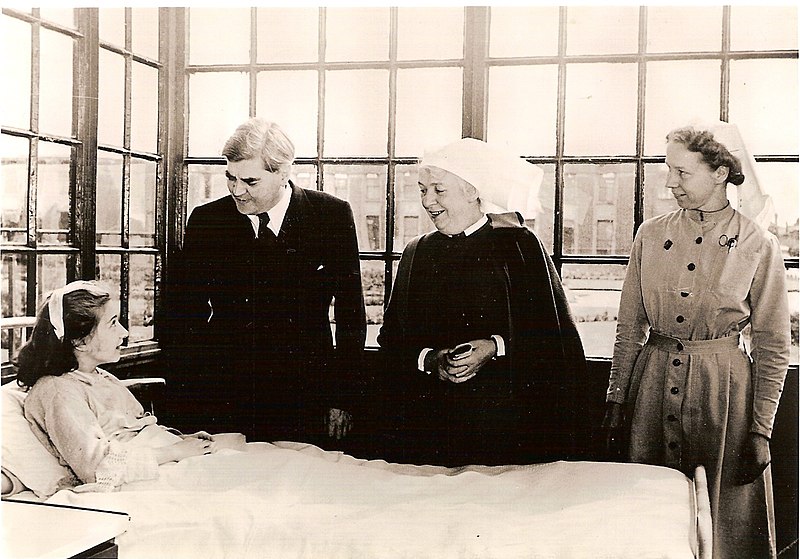Aneurin Bevan is considered one of the greatest statesmen of his era. Yet Bevan often gets wrapped up in his own myth. Bevan is often defined as simply a great speaker, or as the man who founded the NHS. His legacy is today claimed by all political stripes, from beleaguered Labour leadership candidates attempting to burnish their left wing credentials, Labour leaders tweeting incorrect quotes of Bevan’s on the NHS, and even by Conservative Health Secretaries who have subsequently went on to call for patients to pay for care. Bevan’s name has become merely another by-word for NHS support, to be engaged with as vapidly and vaguely as possible by modern politicians. This Is My Truth: Aneurin Bevan in Tribune by Nye Davies is a welcome corrective in this regard, offering a window into Bevan through perhaps his most overlooked work – his writing.
The book is split into five different chapters or overarching themes. The first deals with capitalism and politics, the second Labour and the unions, the third ideals and values, the fourth the Second World War, and the fifth international relations. There is of course crossover with the Second World War cropping up throughout because of Bevan’s prodigious output during the early 1940s. This also allows us to broadly follow Bevan’s progression as a politician from a backbencher who wanted to make a mark to a seasoned political heavyweight with his own faction behind him, meaning the thematic effortlessly intertwines with the chronological.
As the book shows, Bevan’s approach to writing was as direct as his speech making. Many of the articles, particularly the earlier pieces written in the build up to the Second World War, are reactive to what was happening around him. Bevan’s responses to the decaying international and domestic scene give a flavour of why he was not only a popular figure in the Labour Party but why Labour swept to power in 1945. Yet what the articles also demonstrate is that Bevan could be just as focused on statistics and marshal them to his advantage as much as he could rely on emotion. His analysis, for example, of the housing shortage in the article Class War in Commons Committee A focuses squarely on the factual shortage of houses, stating:
In 1931, seventy eight out of every hundred houses were protected against increases in rent. In 1937 only 57 out of every hundred were protected. The figures for Scotland are 77 and 60 respectively. These are working class houses.
Bevan was clearly making an emotive point but one which he conveyed through data. In contrast, as Britain faced becoming involved in the fight for freedom in Europe, Bevan would rely more on the emotive language that he is most famous for. In the 1941 article MPs tongues must be loosened Bevan made a remarkably clear but passionate argument for Parliamentary democracy to continue despite the upheaval of the war. Bevan argued that there are three true great democratic institutions in Britain; the BBC, the press, and Parliament and that each had been in some way curtailed. Bevan directed his ire at a Parliament which he believed having been “elected more than five years ago on an issue so remote that it no longer has relevance to existing realities” was not representative of the concerns of the British public at large.
The argument Bevan presented in the article is a complex and sophisticated one. Bevan examined the interconnection between Parliament and the press, arguing that because MPs are reliant on public opinion to know how to vote in the best interests of that public, the press which helps informs that public opinion cannot be restrained. He further questioned how any government can ensure that parliament functions without any democratic opposition, Labour having at this time been in government as part of the wartime coalition for just over a year. It is a fascinating examination not just of the issue of how freedom can be obtained abroad when some may feel it is curtailed at home but also revealing of Bevan’s character. It shows a man who was well aware of how precious parliamentary democracy is and how easily it could be taken away from those who fought to gain it. He was clearly unafraid to row against the tide of popular opinion, much to the consternation of senior parliamentary colleagues.
Bevan had seen for himself how the Labour Party had grown from nothing and had to scramble to get into Westminster; he had grown to political maturity in a time when women’s voting rights were relatively new. The Bevan that is revealed in this essay and in others in this collection shows a man who was not simply concerned with his own party but with the very core principles of democracy, both in Britain and abroad.
What this book fully demonstrates, through Davies’ excellent choice of articles, is the multifaceted nature of Bevan’s politics and his ability to marshal facts and emotional language as effectively as possible. Bevan’s skill as a writer has long been perhaps overlooked but through this new volume of articles we can truly say that Bevan was not only one of the greatest orators of his time, but also one of the most electrifying writers that the Labour Party produced during the 20th century. To truly understand Aneurin Bevan beyond the platitudinous manner in which his name is often deployed by today’s politicians, This is My Truth is essential reading.


